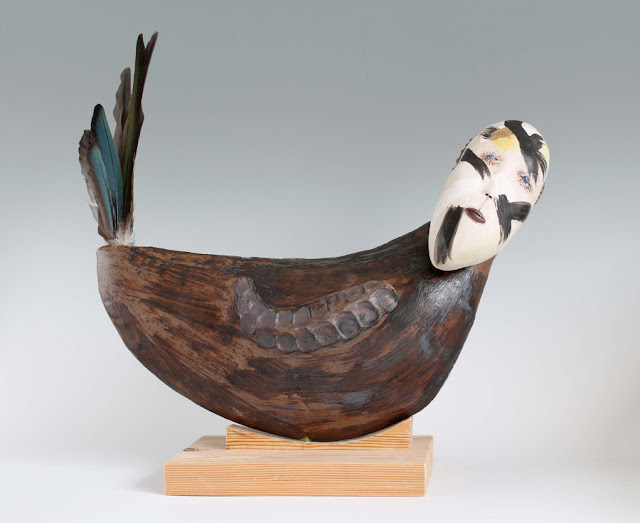Some time ago, I promised to show you one of the pieces I took to my presentation. This is the one. It is an experimental piece in lots of ways. I used two types of clay; grey and white stoneware, and, two types of firing; oxidation and reduction. I used a plaster mould to form the body part; I usually handbuild everything.
I made three supports to fire it in a standing position, but after bisque firing they didn't fit, so I glaze only the back side, and reduction-fired on the front, which I painted some manganese oxide. Then I was given suggestion that the barium glaze might not stick very much on the shelf, so I glazed the front body and re-fired it. But the glaze became black, unexpectedly. I made ceramic tail, but it didn't look right, so I used our parrot's beautiful feathers. I made a plinth for it, but instead of matt black with silvery dots as on the test piece, it fired olive green! So I gave up on it. For the presentation, Mike quickly made this pine mount for me. Wow, so many things had happened to it. I guess I did lots of experiments at one go!
 |
| Front |
 |
| Close-up |
 |
| Back |
 |
| Close-up |
I do like the glaze, so I would use it in future. I will probably not use plaster moulds. I love forming clay with my hand from inside. That's the fun part for me. Using moulds eliminates the joy.
I called her Harpie, but she has never talked to me, so I really don't know her name. Could it be she who keeps Canterbury winter so long? The witch with no name.

She turned out wonderful, I love both sides and the features are perfect.
ReplyDeleteThank you, Linda. I found experiments are so important. I should do more often. Our fellow students and tutor seem to have liked this one, too, especially when I turned it around to show the other side. They seemed to be mesmerized a bit. : D
DeleteBeautiful!
ReplyDeleteThank you, Patricia! : )
DeleteI am intrigued with the piercing blue eyes and all the different textures. Love the added touch of the parrot feather tail.
ReplyDeleteThank you, Willow. She appeared as I made, even after firing. It was interesting experience for me. I should do more experiments!
ReplyDelete